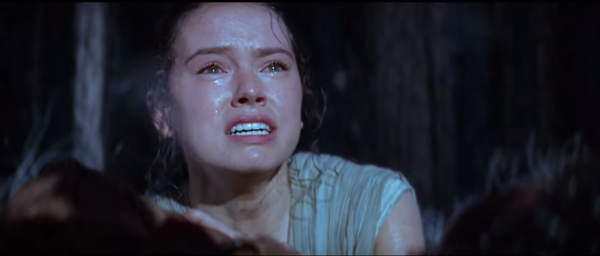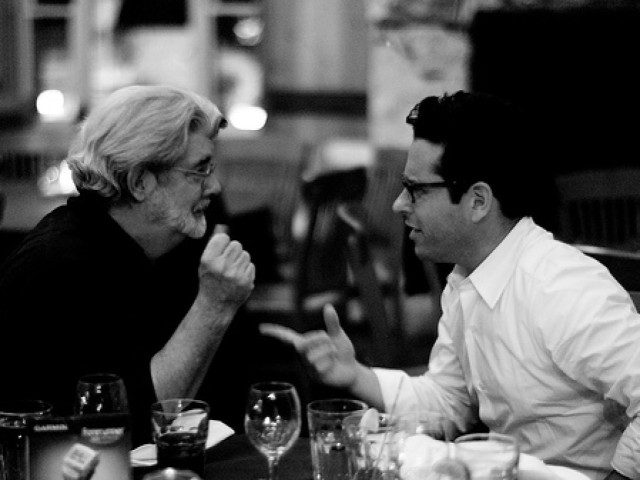First, A Little History…
Star Wars has been a part of my life since I was an awkward 13 year old boy. Apologies to George Lucas, but I recorded most of Episode IV on a brand new micro cassette recorder that my father gave me for my birthday, and for months I would listen to this, memorizing the dialogue, soundtrack and even the sound effects. In short, I was obsessed. My obsession was fulfilled between movie premieres by reading and watching everything I could on the making of the movies, and inspired my early dreams of a career in the cinematic realm. Even though the last trilogy was inferior to the original triad, it was obvious that each new trailer would excite the nerdcore world into a frenzy, myself included.
Granted, the first trilogy does get some love from audiences who watched it as young children. Although there are redeeming aspects of the prequels, time and general opinion have quickly tarnished the standing of Episodes 1-3, and with good reason. How does George Lucas bring together some of the best acting talent of the day (Jake Lloyd not included, not sure about Hayden Christiansen either), and deliver some of the most wooden performances in their careers? Did he care more about green screening backgrounds than the actors? What gives?
So when Disney announced the purchase of Lucasfilm in 2012, and with the promise of more films, I knew that either they would totally destroy the franchise, or totally destroy all box office records. Although JJ Abrams was a solid choice for director, getting screenwriting help from Lawrence Kasdan (co-credited for writing Empire Strikes Back, considered to be the best chapter of the franchise) increased my confidence in Disney’s handling of the franchise. By now it is obvious that they have done their job well, and it is a return to greatness for the franchise. It’s not a perfect film, but to get into it, I need to warn you, the reader –
SPOILERS abound ahead!!!


The Actors Awaken, Too!
I have to say, this movie had me in the first 5 minutes with Kylo Ren Force-holding a laser blast in midair. Ooohh…
The Force Awakens could have been called The Star Wars Magic Awakens. After slogging through some plodding plot lines involving Trade Federations and Galactic Senators and embargoes, and bad performances in the last trilogy (I still feel their are some great things in them, Lucas couldn’t kill ALL the magic), in this latest chapter it’s as if the characters were AWAKENED! Permitted to EMOTE! Develop CHEMISTRY between characters! That alone changed the tone of what we’ve known as Star Wars for the last 16 years. In short order the characters and their motivations are quickly established, without slowing the pace of the movie down. Although I saw and heard quite a few Easter eggs during the movie, there are likely many more that I did not catch (after 2 viewings) that would satisfy the most hardcore Star Wars devotee. Luke’s training remote on the Falcon, the downed AT-AT walker, the mouse droids on Starkiller Base, the orange jumpsuited X-wing fighter doll in Rey’s home, Luke’s lightsaber – these are just a few that I noticed. Thankfully the film does not linger too long on any of them to be annoying, or sacrifice pacing. Abrams really captured what was special about Episode 4 – the action, humor, mysticism and old-fashioned adventure-serial tension. There were some truly great moments – making Luke the McGuffin, the thing to be found, was a great call. The last scene wordless scene with Rey finally discovers Luke; when Rey faces Kylo Ren and force-grabs Luke’s lightsaber, and the score surging with Luke’s theme. Spine tingled.
 Is This Abrams’ Auteur Style?
Is This Abrams’ Auteur Style?
Although a gifted director, and I do appreciate his directorial style (…well, maybe not the lens flares…), I was somewhat concerned when I discovered JJ Abrams was at the helm of this franchise entry, because of his last franchise film, Star Trek Into Darkness. In his sophomore Star Trek effort, he brought back the villain Khan from Star Trek 2: The Wrath Of Khan.
Now, Abrams spent considerable time in his first Star Trek film creating a new timeline/reality, so as to be unencumbered by the prior Star Trek history/timeline for future films. Yet when it came down to it, it seemed he was unnecessarily repeating key elements of the previous Khan movie (some verbatim!), which I know irked a lot of Trekkers, who consider Into Darkness the worst Star Trek movie to date. I think that’s a little harsh, but I did not want something similar to happen for the new Star Wars movie as well.
Well, we did get some of that. What I would have hoped for was a little less adherence to rehashing the plotlines of the first trilogy, especially the first movie, A New Hope. A droid carrying secret data on a desert planet, looking to deliver it to one person, escaping the desert world via the Millenium Falcon, another Death Star-like weapon of mass destruction to defeat with only a band of X-Wing fighters with minutes to spare before it destroys the rebel base – come on now… Kylo Ren echoing Darth Vader. Father and son (Han and Ben Solo/Kylo Ren) confrontation on a walkway above a deep chasm echoing Darth Vader and Luke on Bespin. Rey going solo to search for Luke echoing Luke’s search for Yoda in The Empire Strikes Back. A last battle to destroy the WMD (concurrent with an intense lightsaber duel between light and dark side) echoing Return of the Jedi’s climax. A snow planet, a green planet full of trees. I even felt like there was a special effect homage, where the Millenium Falcon was flying right to left on the screen, briefly swerving up from background to foreground to show its underbelly for a moment during the escape from Jakku, echoing the same shot in The Empire Strikes Back during the asteroid field chase sequence. While waiting to see The Force Awakens a second time, I overheard a few older curmudgeons coming out of the theatre complaining that it was too much like the first movie.
But you know what? It worked – and not just for me (see record breaking box office tallies). Despite all the possibly annoying parallels to earlier films in the franchise – I loved it anyways. Maybe it was because of the familiarity of it all. Maybe it was because it was easy to invest in the new characters. I don’t know – it just worked.
So Many Questions…
Much like the fan fervor from creating mysteries and questions that yearn for an answer in his TV show creation LOST, Abrams has created enough questions in The Force Awakens to rapidly generate a cavalcade of fan theories, and as a fan I am eating up all I can. Rey’s vision alone (what does it mean?) is going to be picked apart and analyzed for months, I am sure. Who is Supreme Leader Snoke really? Who is Rey really, who is her family? How did Luke’s lightsaber get from Bespin to the character Maz? And as in LOST, this is going to generate HUGE fan interest for Episode VIII.
All that being said, I found The Force Awakens to be a total blast. And I have a feeling that the next chapter will be even better. Even JJ Abrams feels like Episode VIII will be special. Why? Because Disney surprised me with hiring Rian Johnson to write and direct the next chapter of the franchise. He is the writer and director behind the largely underseen noir high school film Brick (2006), and the more recent noir sci-fi time travel movie Looper (2012). Having seen both of these (which I recommend), I am boldly predicting that the next chapter of Star Wars will give The Empire Strikes Back a challenge for the best one of them yet. Stay tuned!


 Recently one of my good friends had FINALLY sat down to watch The Godfather and Godfather II, and enjoyed them both. I hope that now he will read this blog and get a deeper appreciation of the film’s artistic value. This is for you, RS!
Recently one of my good friends had FINALLY sat down to watch The Godfather and Godfather II, and enjoyed them both. I hope that now he will read this blog and get a deeper appreciation of the film’s artistic value. This is for you, RS!
